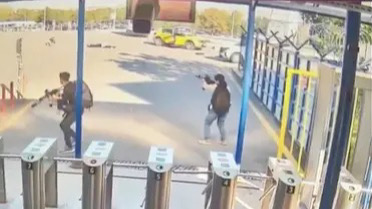Attacks and bombs halt prospects for dialogue between Ankara and the PKK
The deadly attack against an aerospace firm near the capital followed reports that Öcalan might address Turkey’s parliament, and that dialogue with the Kurdish movement might resume. Turkish authorities blame rebels, but no official claim has been made. Turkish warplanes retaliated targeting scores of sites across the border in Syria and Iraq, causing many deaths, including civilians.
Istanbul (AsiaNews) – Against a background of possible renewed talks aimed at pacification, Turkish warplanes struck certain sites in Syria and Iraq causing dozens of deaths, including at least 12 civilians, in the wake of a recent attack in Ankara.
In just a few days, the long-standing conflict between the Turkish government and the military wing of the outlawed Kurdistan Workers' Party (PKK)[*] saw a sudden and bloody flareup, freezing the prospects of an end to the armed struggle.
Rumours about talks stem from reports about jailed PKK leader Abdullah Öcalan, who is quoted as saying, “if conditions allow, I have the necessary theoretical and practical power to shift this process from the arena of conflict and violence to one of law and politics.”
The statement attributed to Turkey’s top domestic enemy comes from a family member; for his part, Turkish President Recep Tayyip Erdoğan signed a military and security deal with Iraq in mid-August targeting the PKK.
Abdullah Öcalan has been in prison since 1999 on Imrali Island, Sea of Marmara, south of Istanbul, where he is serving a life sentence. For the first time since 3 March 2020, he was able to meet a relative, his nephew Omer Öcalan, who is an MP for the pro-Kurdish Peoples' Democratic Party (HDP).[†]
The Kurdish leader entrusted his nephew with a message saying that he is open to talks with the Turkish government in response to an unusual appeal launched on Monday by Devlet Bahceli, leader of Turkey’s far-right Nationalist Movement Party (MHP),[‡] an ally of Erdoğan.
Bahceli’s proposal would see Öcalan invited to speak before the parliament to declare an end to the PKK's armed struggle for independence; thus, he would benefit from the law on the "right to hope" that could lead to his release.
Founded in 1978, the PKK initially fought for an independent Kurdistan, and then shifted towards autonomy.
Turkey and its Western allies, starting with the United States, have designated the group as a terrorist organisation; since the start of the year, the Iraqi government also included it in its list of banned organisations.
In 2010 and 2013, the ruling Justice and Development Party (AKP)[§] government started peace talks, but its overtures did not lead to genuine peace negotiations.
Talks were definitively derailed in 2015, as fighting intensified in the south-eastern part of the country, while the capital, Istanbul, and other cities were hit by a series of attacks, blamed on the PKK, leaving a long trail of blood.
Speaking to AsiaNews, a diplomatic source, contacted on condition of anonymity, said that rumours about overtures between Öcalan and the government, and his possible address to parliament, are only “political theatre" and now it is impossible to "predict developments".
What remains are the attacks against civilians across the border. The latest took place at the same time as Öcalan's prison visit when a man and a woman, both armed, arriving in a taxi, struck the headquarters of the Turkish Aerospace Industries (TUSAS) in the province of Ankara, killing five people and wounding another 22.
No one has yet claimed responsibility but the government was swift to blame the PKK.
Interior Minister Ali Yerlikaya said that the two attackers were "neutralised", while Turkish warplanes hit PKK bases in Syria and Iraq.
Local media reported that after killing the taxi driver, the two attackers drove to the company's premises, where, after evading the guards at the entrance, they set off explosives and opened fire on the staff, killing four individuals, including a mechanical engineer, and wounding 22.
The PKK has neither confirmed nor denied involvement, although the MO and the target are in line with the Kurdish movement’s guerrilla operations. After all, TUSAS is one of Turkey’s largest defence firms, making armed drones and fighter planes used against the PKK.
Turkey quickly retaliated with attacks against 47 PKK "targets", 29 in Iraq and 18 in Syria. In the latter, Turkish planes also hit positions of the People's Protection Units (YPG),[**] which is aligned with the PKK.
In the aftermath of the attack, Turkish authorities also announced a broadcast ban, restricting access to social media platforms, stating that it was an effort to avoid promoting any kind of “terrorist propaganda” at times of crisis or political sensitivity.
Groups like Amnesty International have criticised the decision, saying that such actions are part of a “broader strategy by the Turkish government to exert control over digital communication channels ,” which ends up fuelling “an atmosphere of fear and self-censorship among journalists and citizens”.
What is certain is that this latest outbreak of violence seems to nip in the bud the last – in chronological order – flame of hope for dialogue and peace between the government and Kurdish rebels.
[*] Partiya Karkerên Kurdistanê.
[†] Halkların Demokratik Partisi.
[‡] Milliyetçi Hareket Partisi.
[§] Adalet ve Kalkınma Partisi
[**] Yekîneyên Parastina Gel.







.png)










